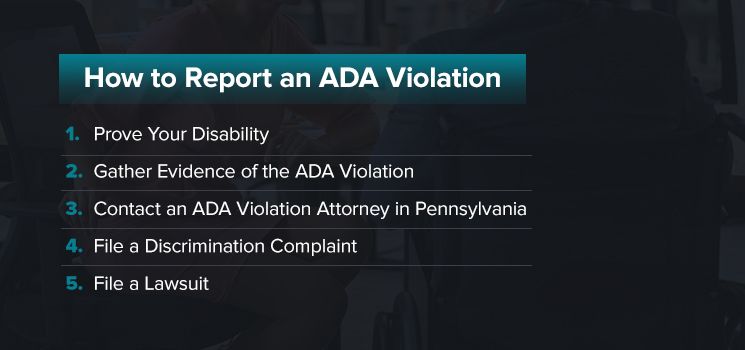The Americans With Disabilities Act (ADA) was designed to help protect people from discrimination in the workplace. However, far too many people don’t understand their rights, and as a result, they don’t take the steps needed to make sure they are treated fairly. Weisberg Cummings, P.C. can help if you have any reason to believe your employer has treated you unjustly due to your disability.
We’re conveniently located in Harrisburg, Pennsylvania, with access to claims across the capital city region and the Commonwealth of Pennsylvania.
Employment Laws When Living With a Disability
The ADA makes employment-based discrimination against someone living with a disability illegal. Under Title I of the ADA, employers who have at least 15 workers must provide qualified employees with disabilities equal access to the employment and related opportunities offered to others.
Under Title I, employers cannot ask about a disability before making a job offer and cannot discriminate during hiring, promotions, pay, recruitment, training or another aspect of employment. Unless doing so would cause unreasonable hardship, employers must make reasonable accommodations for a qualified individual living with a disability.
Types Of ADA Violations
ADA violation attorneys represent clients in a wide range of cases. Disability law is complex and, while there are many exemptions, the ADA clearly spells out a number of employment-related violations.
While disability law can be complex, an experienced ADA lawyer will have the skill and knowledge needed to provide you with the best possible representation. There are many different types of ADA violations employers commit. These include:
- Failure to hire: To be in compliance with the ADA, an employer can’t choose not to hire someone simply because of a disability. There are some positions that are exempt from this requirement, but if someone is able to perform a job with reasonable accommodations, disability can’t be the main reason he or she isn’t hired.
- Failure to make reasonable accommodations: Employers are required by law to make accommodations for disabled employees. For example, this can mean constructing entry and exit ways that are accessible by a wheelchair. This is probably the category that spurs the most ADA lawsuits.
- Job discrimination: Unfortunately, there are many instances where someone with a disability is hired simply as a concession to affirmative action requirements. That person is then held down in his or her career as a result. But just because someone is disabled, it doesn’t mean an employer should use that as an excuse to assign menial tasks or otherwise marginalize the employee. Talk to an ADA lawyer if you have any reason to believe this is happening to you.
- Retaliation/wrongful discharge: Employers will sometimes violate the ADA by retaliating against someone who has filed a workers’ compensation claim after being disabled on the job — or might even terminate that employee wrongfully. Sometimes they will simply choose not to provide the proper accommodations for disabled employees. Pennsylvania is an “at-will” employment state, meaning an employer doesn’t have to provide a reason when terminating a non-contract worker. However, that still doesn’t mean you can be fired or have action taken against you just because you’re disabled. If you suspect that’s the case, you can sue for damages.
Pennsylvania ADA Laws
In addition to federal laws, there are also state laws designed to protect workers living with a disability. The Pennsylvania Human Relations Act is the law that could impact you if you live with a disability and work in Pennsylvania. Under this law, it is illegal for employers to discriminate against independent contractors or employees based on non-job-related disabilities. This law also makes it illegal to discriminate against a worker or contractor because of their need for a guide or a service dog.
Some employers are exempt from this rule by a bona fide occupational qualification (BFOQ) exception. Unlike the federal ADA, Pennsylvania laws cover all employers who have at least four workers.
Under the Pennsylvania Human Relations Act, employers cannot:
- Ask about or document past disabilities of any kind
- Refuse work with someone because of their ability if the person is the most competent for the job
- Refuse employment based on a past disability
- Post job ads suggesting discrimination or preferences when it comes to service animals or disabilities
- Deny employment benefits or equal jobs to someone because of a disability
- Discriminate based on a disability
- Encourage others to discriminate based on a disability
While the Americans With Disabilities Act and state laws mandate disability workplace accommodations, workers living with a disability may still face discrimination. Unfortunately, it can be challenging to prove. Employers may allege other candidates or employees were more qualified for a position or promotion. They may also claim BFOQ exception or may allege reasonable accommodations pose undue hardships. In some cases, employers may claim there were other reasons why someone with a disability was passed over for a job, social event or other benefit.
How to Report an ADA Violation
You have the right to report any type of ADA violation to an attorney, who will then work to protect your rights. There are a couple of things you’ll need to know when you do this.
1. Prove Your Disability
First, try to obtain any medical records you can that may be able to help substantiate your claim. The ADA requires you to prove your disability in a way that relates to the ADA’s definition of disability. The ADA defines disability as a physical or mental impairment that impacts at least one significant major professional or personal life activity. This may include people with past disabilities, like someone in remission from cancer. Find medical records that reflect the history of your impairment.
2. Gather Evidence of the ADA Violation
Gather evidence that shows the event that occurred is related to your disability. This may help you prove that you experienced disability discrimination. Some evidence might include harassment regarding your disability in emails, texts or phone calls. If it was a verbal conversation or remark, it might help to write down what you remember as soon as possible and ask witnesses to testify for you.
Another form of discrimination might include your employer denying requests for necessary accommodation. If you were demoted or denied a promotion despite being as skilled as others without disability in the same position, that might also classify as discrimination. In these situations, you can gather documentation that shows your work performance compared to co-workers.
3. Contact an ADA Violation Attorney in Pennsylvania
After collecting the necessary documents, speak with an ADA violation lawyer about the specifics of your case. Even if you have yet to gather the relevant documents to support your case, an attorney may help organize anything you need and provide you with a list of helpful documents you can use.
4. File a Discrimination Complaint
You can either file your discrimination complaint with the Pennsylvania Human Relations Commission (PHRC) or the U.S. Equal Employment Opportunity Commission (EEOC). While the PHRC covers employers with four or more employees, the EEOC, which enforces the ADA, covers employers with 15 or more employees. Filing with the EEOC will require you to submit the claim within 180-300 days of the incident.
5. File a Lawsuit
This is an optional step you can take if necessary. You must file a discrimination complaint before you can sue the employer. You may request a Notice of Right to Sue from the EEOC after 180 days if the investigation still hasn’t happened. Otherwise, depending on the investigation findings, the EEOC may automatically file a lawsuit on your behalf if necessary.
Types of Compensation for an ADA Violation
Depending on your case, You may either go to trial or reach a settlement agreement with your employer, depending on your case. While you may receive more comprehensive awards and relief if you have more substantial evidence, a trial may take longer than reaching a settlement agreement. Disability discrimination lawyers may help you receive the following types of compensation when winning an employment ADA violation lawsuit:
- Monetary or compensatory relief: This involves receiving payment as compensation for any emotional harm you experienced due to discrimination, such as psychiatric conditions or reputational damage.
- Non-monetary relief: This might include changing company policies, rehiring the employee, implementing disability and ADA training, writing positive reference letters, or providing a requested reasonable accommodation.
- Back pay: If you were wrongfully terminated due to disability discrimination, the employer may owe you funds you would have earned if you continued working.
- Punitive damages: This form of monetary relief is designed to punish employers for malicious, discriminatory actions.
- Lost pay and other benefits: These are monetary payments you could receive to replace lost benefits, such as bonuses, vacation time, health care and pension costs.
What to Do if You Suspect Discrimination
Whether it’s a condition that has been present since birth or something you are still in the process of adjusting to, living with a disability is difficult enough. It isn’t something that should affect your ability to, like all Americans, support your family in a job you are fully qualified to do. If you’ve been passed over, let go or otherwise suffered problems on the job as a result of a disability, contact Weisberg Cummings, P.C. today. Our experienced discrimination attorneys can assess your case and advise on your legal options to more forward with dignity and strength.
To schedule such a consultation, call us today at 717-238-5707 or contact us online.



